2022-05-04 – 2022-05-06
Munich, Germany
Scientific session supported by the Food Allergy Task Force
2022-05-03 – 2022-05-06
Digital, Online
The 7th International Symposium on Food Packaging – Scientific Developments Supporting Safety and Innovation was a digital-only event that was held from 3rd to 6th May, 2022. This event was supported by the Packaging Materials Task Force.
2022-04-26
Singapore, Singapore
- ILSI Southeast Asia Region
2022-04-21
Webinar, GoToWebinar
2022-04-21
Digital Roundtable, Zoom
WP_Query Object
(
[query] => Array
(
[post_type] => event
[posts_per_page] => 5
[type] =>
[area] =>
[before] => 2024-04-27
[after] =>
[tags] =>
[showtitle] =>
[meta_query] => Array
(
[relation] => Array
(
[0] => AND
[1] => AND
)
[0] => Array
(
[key] => _ilsi_date
[value] => 2024-04-27
[compare] => <=
)
[1] => Array
(
[key] => _ilsi_date
[value] => Array
(
[0] => 2022-01-01
[1] => 2022-12-31
)
[compare] => BETWEEN
)
[2] => Array
(
[key] => _ilsi_date
[value] => 2022-12-31
[compare] => <
)
)
[paged] => 12
[meta_key] => _ilsi_date
[orderby] => meta_value
[order] => DESC
)
[query_vars] => Array
(
[post_type] => event
[posts_per_page] => 5
[type] =>
[area] =>
[before] => 2024-04-27
[after] =>
[tags] =>
[showtitle] =>
[meta_query] => Array
(
[relation] => Array
(
[0] => AND
[1] => AND
)
[0] => Array
(
[key] => _ilsi_date
[value] => 2024-04-27
[compare] => <=
)
[1] => Array
(
[key] => _ilsi_date
[value] => Array
(
[0] => 2022-01-01
[1] => 2022-12-31
)
[compare] => BETWEEN
)
[2] => Array
(
[key] => _ilsi_date
[value] => 2022-12-31
[compare] => <
)
)
[paged] => 12
[meta_key] => _ilsi_date
[orderby] => meta_value
[order] => DESC
[error] =>
[m] =>
[p] => 0
[post_parent] =>
[subpost] =>
[subpost_id] =>
[attachment] =>
[attachment_id] => 0
[name] =>
[pagename] =>
[page_id] => 0
[second] =>
[minute] =>
[hour] =>
[day] => 0
[monthnum] => 0
[year] => 0
[w] => 0
[category_name] =>
[tag] =>
[cat] =>
[tag_id] =>
[author] =>
[author_name] =>
[feed] =>
[tb] =>
[meta_value] =>
[preview] =>
[s] =>
[sentence] =>
[title] =>
[fields] =>
[menu_order] =>
[embed] =>
[category__in] => Array
(
)
[category__not_in] => Array
(
)
[category__and] => Array
(
)
[post__in] => Array
(
)
[post__not_in] => Array
(
)
[post_name__in] => Array
(
)
[tag__in] => Array
(
)
[tag__not_in] => Array
(
)
[tag__and] => Array
(
)
[tag_slug__in] => Array
(
)
[tag_slug__and] => Array
(
)
[post_parent__in] => Array
(
)
[post_parent__not_in] => Array
(
)
[author__in] => Array
(
)
[author__not_in] => Array
(
)
[search_columns] => Array
(
)
[ignore_sticky_posts] =>
[suppress_filters] =>
[cache_results] => 1
[update_post_term_cache] => 1
[update_menu_item_cache] =>
[lazy_load_term_meta] => 1
[update_post_meta_cache] => 1
[nopaging] =>
[comments_per_page] => 50
[no_found_rows] =>
)
[tax_query] => WP_Tax_Query Object
(
[queries] => Array
(
)
[relation] => AND
[table_aliases:protected] => Array
(
)
[queried_terms] => Array
(
)
[primary_table] => wp_posts
[primary_id_column] => ID
)
[meta_query] => WP_Meta_Query Object
(
[queries] => Array
(
[0] => Array
(
[key] => _ilsi_date
)
[1] => Array
(
[0] => Array
(
[key] => _ilsi_date
[value] => 2024-04-27
[compare] => <=
)
[1] => Array
(
[key] => _ilsi_date
[value] => Array
(
[0] => 2022-01-01
[1] => 2022-12-31
)
[compare] => BETWEEN
)
[2] => Array
(
[key] => _ilsi_date
[value] => 2022-12-31
[compare] => <
)
[relation] => AND
)
[relation] => AND
)
[relation] => AND
[meta_table] => wp_postmeta
[meta_id_column] => post_id
[primary_table] => wp_posts
[primary_id_column] => ID
[table_aliases:protected] => Array
(
[0] => wp_postmeta
[1] => mt1
[2] => mt2
[3] => mt3
)
[clauses:protected] => Array
(
[wp_postmeta] => Array
(
[key] => _ilsi_date
[compare] => =
[compare_key] => =
[alias] => wp_postmeta
[cast] => CHAR
)
[mt1] => Array
(
[key] => _ilsi_date
[value] => 2024-04-27
[compare] => <=
[compare_key] => =
[alias] => mt1
[cast] => CHAR
)
[mt2] => Array
(
[key] => _ilsi_date
[value] => Array
(
[0] => 2022-01-01
[1] => 2022-12-31
)
[compare] => BETWEEN
[compare_key] => =
[alias] => mt2
[cast] => CHAR
)
[mt3] => Array
(
[key] => _ilsi_date
[value] => 2022-12-31
[compare] => <
[compare_key] => =
[alias] => mt3
[cast] => CHAR
)
)
[has_or_relation:protected] =>
)
[date_query] =>
[request] =>
SELECT SQL_CALC_FOUND_ROWS wp_posts.ID
FROM wp_posts INNER JOIN wp_postmeta ON ( wp_posts.ID = wp_postmeta.post_id ) INNER JOIN wp_postmeta AS mt1 ON ( wp_posts.ID = mt1.post_id ) INNER JOIN wp_postmeta AS mt2 ON ( wp_posts.ID = mt2.post_id ) INNER JOIN wp_postmeta AS mt3 ON ( wp_posts.ID = mt3.post_id )
WHERE 1=1 AND (
wp_postmeta.meta_key = '_ilsi_date'
AND
(
( mt1.meta_key = '_ilsi_date' AND mt1.meta_value <= '2024-04-27' )
AND
( mt2.meta_key = '_ilsi_date' AND mt2.meta_value BETWEEN '2022-01-01' AND '2022-12-31' )
AND
( mt3.meta_key = '_ilsi_date' AND mt3.meta_value < '2022-12-31' )
)
) AND ((wp_posts.post_type = 'event' AND (wp_posts.post_status = 'publish' OR wp_posts.post_status = 'acf-disabled')))
GROUP BY wp_posts.ID
ORDER BY wp_postmeta.meta_value DESC
LIMIT 55, 5
[posts] => Array
(
[0] => WP_Post Object
(
[ID] => 31635
[post_author] => 24
[post_date] => 2022-03-01 07:05:24
[post_date_gmt] => 2022-03-01 07:05:24
[post_content] =>
 About the Symposium
About the Symposium
Since 2005, IAFP's European symposium has been shaping the future of food safety by providing a forum for the exchange of ideas with colleagues from across Europe working in industry, government, and academia. The Symposium is an excellent forum to gain knowledge about the latest-QRAB developments and techniques in food science and safety. The symposium will be held on 4-6 May 2022 in Munich, Germany at the Holiday Inn Munich - City Centre. For more details please visit the IAFP website.
This year ILSI Europe will participate to the Symposium through one scientific session supported by its Food Allergy Task Force. We will also have a booth in the exhibition area: Come visit us and do not hesitate to contact us to organise a one-to-one meeting, we would be very happy to meet and discuss with you.
Application of Food Allergen Risk Assessment and Management: Current Perspective and Issues
Friday, 06 May 2022, 08:30 AM (CEST)
BACKGROUND
Food allergies were recognised as a significant, global public health issue over 25 years ago with the first FAO/WHO Consultation on allergens, which identified 8 priority allergenic foods or food groups. While this recognition implied a need to manage those allergens, the available tools severely limited what could be achieved at the time. In the intervening period, several methodologies have emerged and matured, together with a better understanding of the concept of tolerable risk. These developments and activities, together with the increasing global impact of food allergies on public health led to the recently concluded FAO/WHO Expert Consultation on Risk Assessment of Allergens as well as accompanying Codex activities. The landscape of food allergen management is thus at an inflection point. The previously established practice is that allergen cross-contact is managed in a binary fashion, i.e. either allergen is potentially present or not. This binary approach, which lacked industry alignment on how it was implemented, has led to inaccurate information being passed along supply chains. It has therefore led to a disconnect between the reality of risk and precautionary allergen labelling (PAL) and contributed to the proliferation of uninformative labelling. Fortunately, the current advent of allergen reference doses and their application in quantitative risk assessment can provide an opportunity to refresh how allergen risks are assessed and managed, but only if new tools are implemented consistently across businesses that produce food.
OBJECTIVES
This session presented updates from recent food allergy related activities within Codex committees and FAO/WHO joint expert consultations, explored tools and approaches to harmonize the data gathering process for food allergen risk assessments and their implementation, and investigated the impact on consumers with food allergy when differing risk management strategies for allergen labelling are implemented.
SESSION PROGRAMME
• Update on FAO/Who and Codex Activities Regarding Food Allergens, Prof. René Crevel, René Crevel Consulting Ltd, UK
• Practical Guidance on the Application of Allergen Quantitative Risk Assessment, Dr Neil Buck, General Mills Inc, CH
• Impact on Consumers with Food Allergies of Differing Public Health and Industry Risk Management Strategies, Dr Benjamin Remington, Remington Consulting Group B.V., NL
Contact
For more information on this virtual event, please contact, please contact Dr Isabelle Guelinckx, Scientific Program Director, at iguelinckx@ilsieurope.be or Ms Toula Aslanidis, Project Assistant at taslanidis@ilsieurope.be.
[post_title] => ILSI Europe’s Scientific Session on Food Allergen Quantitative Risk Assessment (QRA) at IAFP’s European Symposium on Food Safety 2022
[post_excerpt] =>
[post_status] => publish
[comment_status] => closed
[ping_status] => closed
[post_password] =>
[post_name] => ilsi-europes-scientific-session-on-food-allergen-quantitative-risk-assessment-qra-at-iafps-european-symposium-on-food-safety-2022
[to_ping] =>
[pinged] =>
[post_modified] => 2022-09-20 02:59:05
[post_modified_gmt] => 2022-09-20 06:59:05
[post_content_filtered] =>
[post_parent] => 0
[guid] => https://ilsi.org/?post_type=event&p=31635
[menu_order] => 0
[post_type] => event
[post_mime_type] =>
[comment_count] => 0
[filter] => raw
)
[1] => WP_Post Object
(
[ID] => 24672
[post_author] => 24
[post_date] => 2019-06-12 08:47:23
[post_date_gmt] => 2019-06-12 12:47:23
[post_content] =>
[post_title] => 7th International Symposium on Food Packaging – Scientific Developments Supporting Safety and Innovation
[post_excerpt] =>
[post_status] => publish
[comment_status] => closed
[ping_status] => closed
[post_password] =>
[post_name] => 7th-international-symposium-on-food-packaging-scientific-developments-supporting-safety-and-innovation
[to_ping] =>
[pinged] =>
[post_modified] => 2022-05-31 09:09:37
[post_modified_gmt] => 2022-05-31 13:09:37
[post_content_filtered] =>
[post_parent] => 0
[guid] => https://ilsi.org/?post_type=event&p=24672
[menu_order] => 0
[post_type] => event
[post_mime_type] =>
[comment_count] => 0
[filter] => raw
)
[2] => WP_Post Object
(
[ID] => 31814
[post_author] => 80
[post_date] => 2022-04-05 09:18:48
[post_date_gmt] => 2022-04-05 09:18:48
[post_content] =>
Health Innovation and Food Systems Transformation: Re-thinking the Way Forward
The United Nations Food Systems Summit 2021 highlighted the challenges of achieving food systems transformations to provide sustainable diets for health impact. Southeast Asia and Australasia are key regions for agriculture and food production, and are home to large populations with diverse cultures and diets. Science and innovation will help to improve agricultural productivity, increase value-added food production, improve health and livelihoods while enhancing food security and reducing environmental impact. This Science Session with plenary speakers and a panel discussion will look at new technologies and innovations, and discuss actions necessary for progress, including investment and research.
Program (Time shown in GMT+8)
Invited Presentations
Expand
11:00- 11:25 AM
Microbiome and Disruptive Innovation - Changing the world in Agri-Food, Nutrition and Health Outcome
Mr. Ross Youngs, Founder & CEO, Biosortia Microbiomics, USA
 Mr. Ross Youngs, Founder and CEO of Biosortia Microbiotics, has spent over 30 years inventing products, technologies, and processes for a variety of industries, and holds over 75 patents worldwide. His recent major innovations include an R&D 100 Award for collaboration on biopolymer technologies. In 2009, Biosortia was awarded a $6 million ARPA-E (U.S. Dept. of Energy R&D) grant for its algal harvesting technology, which helped lead to the development of Biosortia's drug discovery platform. In 1998, Mr. Youngs was awarded the Ernst & Young Ohio Entrepreneur of the Year award.
Mr. Ross Youngs, Founder and CEO of Biosortia Microbiotics, has spent over 30 years inventing products, technologies, and processes for a variety of industries, and holds over 75 patents worldwide. His recent major innovations include an R&D 100 Award for collaboration on biopolymer technologies. In 2009, Biosortia was awarded a $6 million ARPA-E (U.S. Dept. of Energy R&D) grant for its algal harvesting technology, which helped lead to the development of Biosortia's drug discovery platform. In 1998, Mr. Youngs was awarded the Ernst & Young Ohio Entrepreneur of the Year award.
11:25- 11:50 AM
N-of-1 Healthcare to Food Technology: Harnessing Digital Medicine Approaches to Food and Nutrition Challenges
Prof. Dean Ho, Director, The N.1 Institute for Health (N.1), National University of Singapore, Singapore
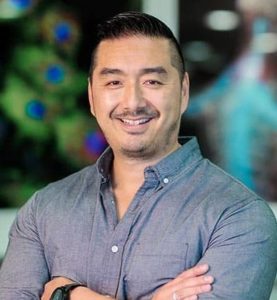
Prof. Dean Ho is the Provost's Chair Professor, Director of The N.1 Institute for Health (N.1), Director of The Institute for Digital Medicine (WisDM) and Head of the Department of Biomedical Engineering at the National University of Singapore. Prof. Ho and collaborators successfully developed and validated CURATE.AI, a powerful digital medicine platform that has optimized human treatment for broad indications ranging from oncology to infectious diseases. He is a Fellow of the US National Academy of Inventors (NAI), the American Institute for Medical and Biological Engineering (AIMBE), and the Royal Society of Chemistry. He was also recently named to the HIMSS Future50 Class of 2021 for his internationally recognized leadership in digital health.
11:50- 12:00 PM
Short Break
Panel Discussion
Expand
12:00 - 12:30 PM
Science, Innovation and Food Systems Transformation: Way Forward in SE Asia
Moderated by Mr. Geoffry Smith, President, ILSI SEA Region, Singapore.
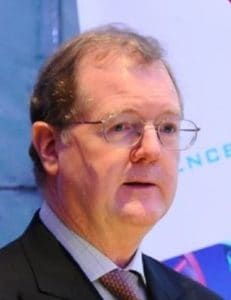 Mr. Geoffry Smith is President of ILSI Southeast Asia Region based in Singapore, and a Representative of the branch to the ILSI Global Assembly. He is also the Chairman of the Essential Micronutrients Foundation, a non-profit organization which addresses micronutrient deficiencies globally as a public health issue. In addition, he is Director of Nutrition Strategies International which deals with food and nutrition issues in developing countries. Mr. Smith serves as a member of the editorial board of the journal Food and Nutrition Bulletin. Prior to his current positions, Mr. Smith was the Global Director, Health Chelates for Akzo Nobel Functional Chemicals, and directed the global business for these compounds in food and nutrition as well as pharmaceutical applications. He was responsible for the global project within Akzo Nobel addressing iron deficiency anemia.
Mr. Geoffry Smith is President of ILSI Southeast Asia Region based in Singapore, and a Representative of the branch to the ILSI Global Assembly. He is also the Chairman of the Essential Micronutrients Foundation, a non-profit organization which addresses micronutrient deficiencies globally as a public health issue. In addition, he is Director of Nutrition Strategies International which deals with food and nutrition issues in developing countries. Mr. Smith serves as a member of the editorial board of the journal Food and Nutrition Bulletin. Prior to his current positions, Mr. Smith was the Global Director, Health Chelates for Akzo Nobel Functional Chemicals, and directed the global business for these compounds in food and nutrition as well as pharmaceutical applications. He was responsible for the global project within Akzo Nobel addressing iron deficiency anemia.
Panelists
Mr. Anang Nugroho, Director for Food and Agriculture, Ministry of National Development Planning, Indonesia
 Mr. Anang Nugroho has over 30 years of experience in public service in Indonesia, and served as Director for Food and Agriculture, Ministry of National Development Planning since 2018. Besides the ministry, he has worked for several government agencies, the Cabinet Secretariat, State Secretariat, and Investment Coordinating Board. From 2013 - 2014, Mr. Nugroho served as Deputy Lead Shepherd for Ocean and Fisheries Working Group in APEC, facilitating the coordination of ocean-related issues in APEC; he also served as Coordinator for ASEAN Fisheries for Public Private Partnership in 2014. In 2014 - 2016, he served as Chairman of Financial Resources Working Group and Coordinating Mechanism Working Group for the Coral Triangle Initiative (CTI). Since 2018, Mr. Nugroho has served as the National Chair for SDG2 End Hunger.
Mr. Anang Nugroho has over 30 years of experience in public service in Indonesia, and served as Director for Food and Agriculture, Ministry of National Development Planning since 2018. Besides the ministry, he has worked for several government agencies, the Cabinet Secretariat, State Secretariat, and Investment Coordinating Board. From 2013 - 2014, Mr. Nugroho served as Deputy Lead Shepherd for Ocean and Fisheries Working Group in APEC, facilitating the coordination of ocean-related issues in APEC; he also served as Coordinator for ASEAN Fisheries for Public Private Partnership in 2014. In 2014 - 2016, he served as Chairman of Financial Resources Working Group and Coordinating Mechanism Working Group for the Coral Triangle Initiative (CTI). Since 2018, Mr. Nugroho has served as the National Chair for SDG2 End Hunger.
Mr. John Eng, Head of Agri-Food Division, Economic Development Board, Singapore
 Mr. John Eng is Acting Vice President and Head of the Agri-Food Division at the Singapore Economic Development Board. In his current role, Mr. Eng leads a team to engage with global companies and develop strategies to position Singapore as an ecosystem for Agri-Food innovation. Prior to this, he was based in EDB's Chicago Office from 2015 - 2018 as Regional Director, Americas, facilitating investments in industries such as biomedical sciences, food and nutrition, infocomms and media, natural resources, and professional services. Mr. Eng completed the Joint Masters of Translational Medicine program at the University of California, Berkeley and San Francisco, and holds a BSc with Honours in Biological Sciences from Singapore's Nanyang Technological University.
Mr. John Eng is Acting Vice President and Head of the Agri-Food Division at the Singapore Economic Development Board. In his current role, Mr. Eng leads a team to engage with global companies and develop strategies to position Singapore as an ecosystem for Agri-Food innovation. Prior to this, he was based in EDB's Chicago Office from 2015 - 2018 as Regional Director, Americas, facilitating investments in industries such as biomedical sciences, food and nutrition, infocomms and media, natural resources, and professional services. Mr. Eng completed the Joint Masters of Translational Medicine program at the University of California, Berkeley and San Francisco, and holds a BSc with Honours in Biological Sciences from Singapore's Nanyang Technological University.
Dr. Cecilia Acuin, Associate Professor, The Institute of Human Nutrition and Food, University of the Philippines Los Banos, Philippines
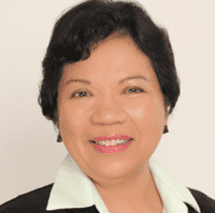 Dr. Cecilia Acuin is an Associate Professor at the Institute of Human Nutrition and Food, University of the Philippines at Los Banos. Previously, she served as Senior Scientist, lead for Human Nutrition, at the International Rice Research Institute (IRRI), Philippines. She was also the Chief Science Research Specialist, Nutritional Assessment & Monitoring Division and Chair, Institutional Ethics Committee at the Food & Nutrition Research Institute (FNRI) where she was responsible for the conduct of the Philippine National Nutrition Surveys, and oversaw nutrition research projects. Dr. Acuin's involvement in multi-country research initiatives includes, among many others, Member of the International Union of Nutritional Sciences Committee on Nutrition and Anthropology; and Consultant and Vice-Chair of the WHO Western Pacific (WPRO) Regional Advisory Committee on Health Research. Dr. Acuin has also been the Co-Chair of the Philippine National Health Research System, Research Utilization Committee; and consultant in various capacities for USAID, UNICEF, World Bank etc.
Dr. Cecilia Acuin is an Associate Professor at the Institute of Human Nutrition and Food, University of the Philippines at Los Banos. Previously, she served as Senior Scientist, lead for Human Nutrition, at the International Rice Research Institute (IRRI), Philippines. She was also the Chief Science Research Specialist, Nutritional Assessment & Monitoring Division and Chair, Institutional Ethics Committee at the Food & Nutrition Research Institute (FNRI) where she was responsible for the conduct of the Philippine National Nutrition Surveys, and oversaw nutrition research projects. Dr. Acuin's involvement in multi-country research initiatives includes, among many others, Member of the International Union of Nutritional Sciences Committee on Nutrition and Anthropology; and Consultant and Vice-Chair of the WHO Western Pacific (WPRO) Regional Advisory Committee on Health Research. Dr. Acuin has also been the Co-Chair of the Philippine National Health Research System, Research Utilization Committee; and consultant in various capacities for USAID, UNICEF, World Bank etc.
Mr. Ross Youngs, Founder & CEO, Biosortia Microbiomics, USA
 Mr. Ross Youngs, Founder and CEO of Biosortia Microbiotics, has spent over 30 years inventing products, technologies, and processes for a variety of industries, and holds over 75 patents worldwide. His recent major innovations include an R&D 100 Award for collaboration on biopolymer technologies. In 2009, Biosortia was awarded a $6 million ARPA-E (U.S. Dept. of Energy R&D) grant for its algal harvesting technology, which helped lead to the development of Biosortia's drug discovery platform. In 1998, Mr. Youngs was awarded the Ernst & Young Ohio Entrepreneur of the Year award.
Mr. Ross Youngs, Founder and CEO of Biosortia Microbiotics, has spent over 30 years inventing products, technologies, and processes for a variety of industries, and holds over 75 patents worldwide. His recent major innovations include an R&D 100 Award for collaboration on biopolymer technologies. In 2009, Biosortia was awarded a $6 million ARPA-E (U.S. Dept. of Energy R&D) grant for its algal harvesting technology, which helped lead to the development of Biosortia's drug discovery platform. In 1998, Mr. Youngs was awarded the Ernst & Young Ohio Entrepreneur of the Year award.
Prof. Dean Ho, Director, The N.1 Institute for Health, National University of Singapore, Singapore

Prof. Dean Ho is the Provost's Chair Professor, Director of The N.1 Institute for Health (N.1), Director of The Institute for Digital Medicine (WisDM) and Head of the Department of Biomedical Engineering at the National University of Singapore. Prof. Ho and collaborators successfully developed and validated CURATE.AI, a powerful digital medicine platform that has optimized human treatment for broad indications ranging from oncology to infectious diseases. He is a Fellow of the US National Academy of Inventors (NAI), the American Institute for Medical and Biological Engineering (AIMBE), and the Royal Society of Chemistry. He was also recently named to the HIMSS Future50 Class of 2021 for his internationally recognized leadership in digital health.
[post_title] => Science Session in conjunction with ILSI SEA Region 2022 Annual Meeting
[post_excerpt] =>
[post_status] => publish
[comment_status] => closed
[ping_status] => closed
[post_password] =>
[post_name] => science-session2022
[to_ping] =>
[pinged] =>
[post_modified] => 2022-04-26 23:46:45
[post_modified_gmt] => 2022-04-27 03:46:45
[post_content_filtered] =>
[post_parent] => 0
[guid] => https://ilsi.org/event/science-session-in-conjunction-with-ilsi-sea-region-2022-annual-meeting/
[menu_order] => 0
[post_type] => event
[post_mime_type] =>
[comment_count] => 0
[filter] => raw
)
[3] => WP_Post Object
(
[ID] => 31598
[post_author] => 24
[post_date] => 2022-02-23 04:51:44
[post_date_gmt] => 2022-02-23 08:51:44
[post_content] =>
Watch the Webinar HERE - Questions & Answers available HERE
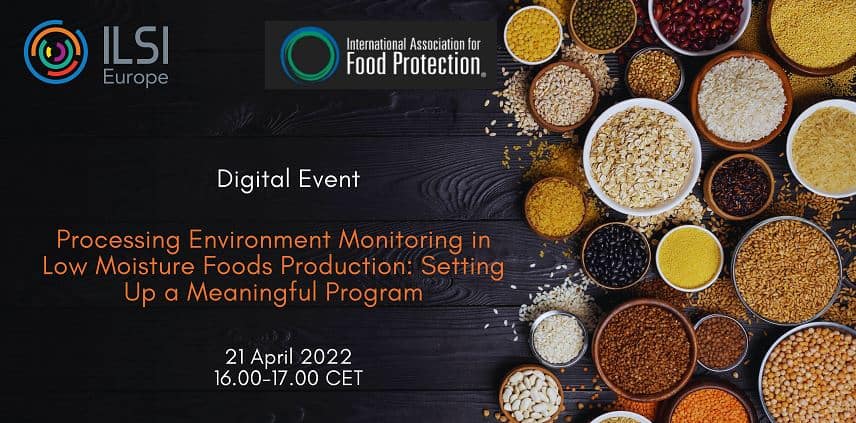
About the webinar
Recent foodborne outbreaks involving low moisture foods highlight that a well-designed Processing environment monitoring (PEM) is increasingly important in the context of food safety management systems. However, PEM can only form an integral part of food safety systems when it is adequately designed and implemented: looking at the correct organisms of concern, at the right locations and times, using suitable and validated sampling and testing approaches, and being looked at / trended by trained personnel. Such a well-defined and implemented PEM can provide further assurance that the processing environment will not contribute to contamination of products. In this webinar, experts with academic and industrial experience unraveled how to develop a risk-based approach to support setting up a meaningful program, how to react in case of potential findings and why / what are the technologies to further characterize detected organisms.
Speakers
Mr François Bourdichon, Catholic University of Sacred Heart, IT
Prof. Séamus Fanning, University College Dublin, IE
Prof. Marcel Zwietering, University of Wageningen, NL
Moderator
Dr Anett Winkler, Cargill, DE
Contact
For more information on this digital event, please contact Dr Isabelle Guelinckx, Scientific Program Director, at iguelinckx@ilsieurope.be or Ms Toula Aslanidis, Project Assistant at taslanidis@ilsieurope.be.
[post_title] => Processing Environment Monitoring in Low Moisture Foods Production: Setting Up a Meaningful Program
[post_excerpt] =>
[post_status] => publish
[comment_status] => closed
[ping_status] => closed
[post_password] =>
[post_name] => processing-environment-monitoring-in-low-moisture-foods-production-setting-up-a-meaningful-program
[to_ping] =>
[pinged] =>
[post_modified] => 2022-07-29 08:08:26
[post_modified_gmt] => 2022-07-29 12:08:26
[post_content_filtered] =>
[post_parent] => 0
[guid] => https://ilsi.org/?post_type=event&p=31598
[menu_order] => 0
[post_type] => event
[post_mime_type] =>
[comment_count] => 0
[filter] => raw
)
[4] => WP_Post Object
(
[ID] => 31874
[post_author] => 24
[post_date] => 2022-04-08 15:31:26
[post_date_gmt] => 2022-04-08 15:31:26
[post_content] =>
Watch the recording here - Read the summary publication here
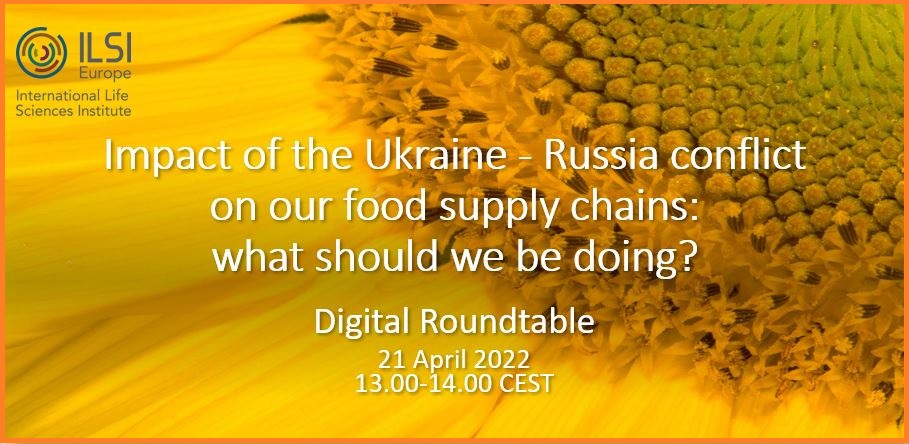 About the roundtable
About the roundtable
The Ukraine-Russia crisis has significant implications for food supply chains. Together Russia and Ukraine account for nearly a third of global wheat exports, 19% of exported corn and 80% of exports of sunflower oil, the third most traded vegetable oil internationally. Sunflower oil is mostly used in the food industry, where it can be segmented into: use as an ingredient in processed foods (e.g. margarine, sauces, mayonnaise, frying, etc) and use as a final product in bottled form as a multi-purpose cooking oil. Additional uses of sunflower oil includes as an emollient in cosmetics formulations. As the conflict continues, the supply of this oil is jeopardized and the industry is challenged to come up with alternatives for this ingredient. Replacing one ingredient with another is not very easy and many aspects such as nutritional quality, food safety (exposure to contaminants), and regulatory issues have to be taken into account. The ramifications of this crisis unfortunately goes way beyond these issues and raise concerns about food security and food fraud amongst others.
This digital roundtable aimed to discuss potential short-term solutions to address the critical supply of oils and other exports as well as longer term actions to improve the resilience of our food system.
Moderators
- Prof. Louise Dye (Leeds University, UK)
- Prof. Philip Calder (Southampton University, UK)
Panellists
- Prof. John Ingram, University of Oxford, UK
- Prof. Alan Boobis, Imperial College London, UK
- Dr Hans Verhagen, Food Safety & Nutrition Consultancy, NL
- Kate Halliwell, Food & Drink Federation, UK
- Dr Tesse Avermaete, Catholic University Leuven, BE
- Lynn Brown, HarvestPlus, US
- Dr Bert Popping, FOCOS, DE
Contact
For more information on this digital event, please contact Dr Isabelle Guelinckx, Scientific Program Director, at iguelinckx@ilsieurope.be
[post_title] => Impact of the Ukraine - Russia conflict on our food supply chains: what should we be doing?
[post_excerpt] =>
[post_status] => publish
[comment_status] => closed
[ping_status] => closed
[post_password] =>
[post_name] => impact-of-the-ukraine-russia-conflict-on-our-food-supply-chains-what-should-we-be-doing
[to_ping] =>
[pinged] =>
[post_modified] => 2023-02-28 12:38:00
[post_modified_gmt] => 2023-02-28 17:38:00
[post_content_filtered] =>
[post_parent] => 0
[guid] => https://ilsi.org/?post_type=event&p=31874
[menu_order] => 0
[post_type] => event
[post_mime_type] =>
[comment_count] => 0
[filter] => raw
)
)
[post_count] => 5
[current_post] => -1
[before_loop] =>
[in_the_loop] =>
[post] => WP_Post Object
(
[ID] => 31635
[post_author] => 24
[post_date] => 2022-03-01 07:05:24
[post_date_gmt] => 2022-03-01 07:05:24
[post_content] =>
 About the Symposium
About the Symposium
Since 2005, IAFP's European symposium has been shaping the future of food safety by providing a forum for the exchange of ideas with colleagues from across Europe working in industry, government, and academia. The Symposium is an excellent forum to gain knowledge about the latest-QRAB developments and techniques in food science and safety. The symposium will be held on 4-6 May 2022 in Munich, Germany at the Holiday Inn Munich - City Centre. For more details please visit the IAFP website.
This year ILSI Europe will participate to the Symposium through one scientific session supported by its Food Allergy Task Force. We will also have a booth in the exhibition area: Come visit us and do not hesitate to contact us to organise a one-to-one meeting, we would be very happy to meet and discuss with you.
Application of Food Allergen Risk Assessment and Management: Current Perspective and Issues
Friday, 06 May 2022, 08:30 AM (CEST)
BACKGROUND
Food allergies were recognised as a significant, global public health issue over 25 years ago with the first FAO/WHO Consultation on allergens, which identified 8 priority allergenic foods or food groups. While this recognition implied a need to manage those allergens, the available tools severely limited what could be achieved at the time. In the intervening period, several methodologies have emerged and matured, together with a better understanding of the concept of tolerable risk. These developments and activities, together with the increasing global impact of food allergies on public health led to the recently concluded FAO/WHO Expert Consultation on Risk Assessment of Allergens as well as accompanying Codex activities. The landscape of food allergen management is thus at an inflection point. The previously established practice is that allergen cross-contact is managed in a binary fashion, i.e. either allergen is potentially present or not. This binary approach, which lacked industry alignment on how it was implemented, has led to inaccurate information being passed along supply chains. It has therefore led to a disconnect between the reality of risk and precautionary allergen labelling (PAL) and contributed to the proliferation of uninformative labelling. Fortunately, the current advent of allergen reference doses and their application in quantitative risk assessment can provide an opportunity to refresh how allergen risks are assessed and managed, but only if new tools are implemented consistently across businesses that produce food.
OBJECTIVES
This session presented updates from recent food allergy related activities within Codex committees and FAO/WHO joint expert consultations, explored tools and approaches to harmonize the data gathering process for food allergen risk assessments and their implementation, and investigated the impact on consumers with food allergy when differing risk management strategies for allergen labelling are implemented.
SESSION PROGRAMME
• Update on FAO/Who and Codex Activities Regarding Food Allergens, Prof. René Crevel, René Crevel Consulting Ltd, UK
• Practical Guidance on the Application of Allergen Quantitative Risk Assessment, Dr Neil Buck, General Mills Inc, CH
• Impact on Consumers with Food Allergies of Differing Public Health and Industry Risk Management Strategies, Dr Benjamin Remington, Remington Consulting Group B.V., NL
Contact
For more information on this virtual event, please contact, please contact Dr Isabelle Guelinckx, Scientific Program Director, at iguelinckx@ilsieurope.be or Ms Toula Aslanidis, Project Assistant at taslanidis@ilsieurope.be.
[post_title] => ILSI Europe’s Scientific Session on Food Allergen Quantitative Risk Assessment (QRA) at IAFP’s European Symposium on Food Safety 2022
[post_excerpt] =>
[post_status] => publish
[comment_status] => closed
[ping_status] => closed
[post_password] =>
[post_name] => ilsi-europes-scientific-session-on-food-allergen-quantitative-risk-assessment-qra-at-iafps-european-symposium-on-food-safety-2022
[to_ping] =>
[pinged] =>
[post_modified] => 2022-09-20 02:59:05
[post_modified_gmt] => 2022-09-20 06:59:05
[post_content_filtered] =>
[post_parent] => 0
[guid] => https://ilsi.org/?post_type=event&p=31635
[menu_order] => 0
[post_type] => event
[post_mime_type] =>
[comment_count] => 0
[filter] => raw
)
[comment_count] => 0
[current_comment] => -1
[found_posts] => 66
[max_num_pages] => 14
[max_num_comment_pages] => 0
[is_single] =>
[is_preview] =>
[is_page] =>
[is_archive] =>
[is_date] =>
[is_year] =>
[is_month] =>
[is_day] =>
[is_time] =>
[is_author] =>
[is_category] =>
[is_tag] =>
[is_tax] =>
[is_search] =>
[is_feed] =>
[is_comment_feed] =>
[is_trackback] =>
[is_home] => 1
[is_privacy_policy] =>
[is_404] =>
[is_embed] =>
[is_paged] => 1
[is_admin] =>
[is_attachment] =>
[is_singular] =>
[is_robots] =>
[is_favicon] =>
[is_posts_page] =>
[is_post_type_archive] =>
[query_vars_hash:WP_Query:private] => 10f81d50017db9b7dc492963710e9fb6
[query_vars_changed:WP_Query:private] =>
[thumbnails_cached] =>
[allow_query_attachment_by_filename:protected] =>
[stopwords:WP_Query:private] =>
[compat_fields:WP_Query:private] => Array
(
[0] => query_vars_hash
[1] => query_vars_changed
)
[compat_methods:WP_Query:private] => Array
(
[0] => init_query_flags
[1] => parse_tax_query
)
)
 About the Symposium
About the Symposium Mr. Ross Youngs, Founder and CEO of Biosortia Microbiotics, has spent over 30 years inventing products, technologies, and processes for a variety of industries, and holds over 75 patents worldwide. His recent major innovations include an R&D 100 Award for collaboration on biopolymer technologies. In 2009, Biosortia was awarded a $6 million ARPA-E (U.S. Dept. of Energy R&D) grant for its algal harvesting technology, which helped lead to the development of Biosortia's drug discovery platform. In 1998, Mr. Youngs was awarded the Ernst & Young Ohio Entrepreneur of the Year award.
Mr. Ross Youngs, Founder and CEO of Biosortia Microbiotics, has spent over 30 years inventing products, technologies, and processes for a variety of industries, and holds over 75 patents worldwide. His recent major innovations include an R&D 100 Award for collaboration on biopolymer technologies. In 2009, Biosortia was awarded a $6 million ARPA-E (U.S. Dept. of Energy R&D) grant for its algal harvesting technology, which helped lead to the development of Biosortia's drug discovery platform. In 1998, Mr. Youngs was awarded the Ernst & Young Ohio Entrepreneur of the Year award.
 Mr. Geoffry Smith is President of ILSI Southeast Asia Region based in Singapore, and a Representative of the branch to the ILSI Global Assembly. He is also the Chairman of the Essential Micronutrients Foundation, a non-profit organization which addresses micronutrient deficiencies globally as a public health issue. In addition, he is Director of Nutrition Strategies International which deals with food and nutrition issues in developing countries. Mr. Smith serves as a member of the editorial board of the journal Food and Nutrition Bulletin. Prior to his current positions, Mr. Smith was the Global Director, Health Chelates for Akzo Nobel Functional Chemicals, and directed the global business for these compounds in food and nutrition as well as pharmaceutical applications. He was responsible for the global project within Akzo Nobel addressing iron deficiency anemia.
Mr. Geoffry Smith is President of ILSI Southeast Asia Region based in Singapore, and a Representative of the branch to the ILSI Global Assembly. He is also the Chairman of the Essential Micronutrients Foundation, a non-profit organization which addresses micronutrient deficiencies globally as a public health issue. In addition, he is Director of Nutrition Strategies International which deals with food and nutrition issues in developing countries. Mr. Smith serves as a member of the editorial board of the journal Food and Nutrition Bulletin. Prior to his current positions, Mr. Smith was the Global Director, Health Chelates for Akzo Nobel Functional Chemicals, and directed the global business for these compounds in food and nutrition as well as pharmaceutical applications. He was responsible for the global project within Akzo Nobel addressing iron deficiency anemia. Mr. Anang Nugroho has over 30 years of experience in public service in Indonesia, and served as Director for Food and Agriculture, Ministry of National Development Planning since 2018. Besides the ministry, he has worked for several government agencies, the Cabinet Secretariat, State Secretariat, and Investment Coordinating Board. From 2013 - 2014, Mr. Nugroho served as Deputy Lead Shepherd for Ocean and Fisheries Working Group in APEC, facilitating the coordination of ocean-related issues in APEC; he also served as Coordinator for ASEAN Fisheries for Public Private Partnership in 2014. In 2014 - 2016, he served as Chairman of Financial Resources Working Group and Coordinating Mechanism Working Group for the Coral Triangle Initiative (CTI). Since 2018, Mr. Nugroho has served as the National Chair for SDG2 End Hunger.
Mr. Anang Nugroho has over 30 years of experience in public service in Indonesia, and served as Director for Food and Agriculture, Ministry of National Development Planning since 2018. Besides the ministry, he has worked for several government agencies, the Cabinet Secretariat, State Secretariat, and Investment Coordinating Board. From 2013 - 2014, Mr. Nugroho served as Deputy Lead Shepherd for Ocean and Fisheries Working Group in APEC, facilitating the coordination of ocean-related issues in APEC; he also served as Coordinator for ASEAN Fisheries for Public Private Partnership in 2014. In 2014 - 2016, he served as Chairman of Financial Resources Working Group and Coordinating Mechanism Working Group for the Coral Triangle Initiative (CTI). Since 2018, Mr. Nugroho has served as the National Chair for SDG2 End Hunger. Mr. John Eng is Acting Vice President and Head of the Agri-Food Division at the Singapore Economic Development Board. In his current role, Mr. Eng leads a team to engage with global companies and develop strategies to position Singapore as an ecosystem for Agri-Food innovation. Prior to this, he was based in EDB's Chicago Office from 2015 - 2018 as Regional Director, Americas, facilitating investments in industries such as biomedical sciences, food and nutrition, infocomms and media, natural resources, and professional services. Mr. Eng completed the Joint Masters of Translational Medicine program at the University of California, Berkeley and San Francisco, and holds a BSc with Honours in Biological Sciences from Singapore's Nanyang Technological University.
Mr. John Eng is Acting Vice President and Head of the Agri-Food Division at the Singapore Economic Development Board. In his current role, Mr. Eng leads a team to engage with global companies and develop strategies to position Singapore as an ecosystem for Agri-Food innovation. Prior to this, he was based in EDB's Chicago Office from 2015 - 2018 as Regional Director, Americas, facilitating investments in industries such as biomedical sciences, food and nutrition, infocomms and media, natural resources, and professional services. Mr. Eng completed the Joint Masters of Translational Medicine program at the University of California, Berkeley and San Francisco, and holds a BSc with Honours in Biological Sciences from Singapore's Nanyang Technological University. Dr. Cecilia Acuin is an Associate Professor at the Institute of Human Nutrition and Food, University of the Philippines at Los Banos. Previously, she served as Senior Scientist, lead for Human Nutrition, at the International Rice Research Institute (IRRI), Philippines. She was also the Chief Science Research Specialist, Nutritional Assessment & Monitoring Division and Chair, Institutional Ethics Committee at the Food & Nutrition Research Institute (FNRI) where she was responsible for the conduct of the Philippine National Nutrition Surveys, and oversaw nutrition research projects. Dr. Acuin's involvement in multi-country research initiatives includes, among many others, Member of the International Union of Nutritional Sciences Committee on Nutrition and Anthropology; and Consultant and Vice-Chair of the WHO Western Pacific (WPRO) Regional Advisory Committee on Health Research. Dr. Acuin has also been the Co-Chair of the Philippine National Health Research System, Research Utilization Committee; and consultant in various capacities for USAID, UNICEF, World Bank etc.
Dr. Cecilia Acuin is an Associate Professor at the Institute of Human Nutrition and Food, University of the Philippines at Los Banos. Previously, she served as Senior Scientist, lead for Human Nutrition, at the International Rice Research Institute (IRRI), Philippines. She was also the Chief Science Research Specialist, Nutritional Assessment & Monitoring Division and Chair, Institutional Ethics Committee at the Food & Nutrition Research Institute (FNRI) where she was responsible for the conduct of the Philippine National Nutrition Surveys, and oversaw nutrition research projects. Dr. Acuin's involvement in multi-country research initiatives includes, among many others, Member of the International Union of Nutritional Sciences Committee on Nutrition and Anthropology; and Consultant and Vice-Chair of the WHO Western Pacific (WPRO) Regional Advisory Committee on Health Research. Dr. Acuin has also been the Co-Chair of the Philippine National Health Research System, Research Utilization Committee; and consultant in various capacities for USAID, UNICEF, World Bank etc. 
 About the roundtable
About the roundtable